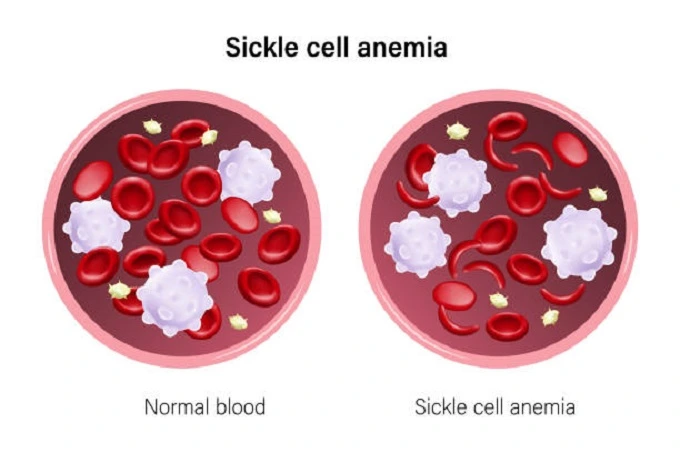Most common hereditary diseases

A child is at risk of inheriting diseases from their parents and other close relatives and their appearance, qualities, and personality features. According to scientists’ findings, more than six thousand diseases can be passed down from generation to generation. In addition to this, some of them may not show their symptoms until adulthood, and they may be passed on from generation to generation. We provide information in this article about the most common hereditary diseases.
10 most common hereditary diseases
1. Diabetes
If you have been told that you have diabetes, there is a good probability that other family members have also had the disease at some point in their lives. If both of a child’s parents have diabetes, then there is a 70 percent chance of passing the disease on to the child. Assuming that just the father contributes % and the mother contributes 7 %.
Additionally, the condition can be handed down from one generation to another. If both of your parents are healthy and one or both of your grandparents had diabetes, you need to keep a close eye on your health and check your blood sugar levels regularly.
2. Hypertension

If you have a family history of high blood pressure or a heart attack or stroke before the age of 40, your chances of developing the condition are much greater.
Hypertension is almost always passed down through the maternal line. It can, however, be passed down through the father’s line. You still need to monitor your health and have regular medical check-ups even if no one in your family has ever had this disease.
3. Myopia
One of the most common inherited diseases is myopia. If both parents have myopia, the chances of their child developing the condition are greatly increased.
Regular eye-muscle-strengthening exercises should be done by the child, and they should avoid spending too much time in front of monitors.
4. Depression and anxiety syndrome

There are many reasons why mental health problems can develop. The hereditary factor is one of them. For example, anxiety and depression are diseases that can be passed down from generation to generation.
If children see that their mother acts aloof, sleeps a lot, and is reluctant to interact with other people, they will do the same is very high.
The good news is that depression is quite manageable. And if you feel like you can’t control your emotions, have addictions, and don’t sleep well, you might want to see a psychologist.
5. Alzheimer’s disease
One possible factor in the development of Alzheimer’s disease is heredity. This form of dementia affects both men and women.
But you can reduce the risk of developing the disease even if your relatives have encountered it. To do this, you need to lead a healthy lifestyle and control the level of cholesterol in the blood. And most importantly – constantly learn something new, loading your brain with different information
6. Cancer

Hereditary oncological disorders have been found. The risk of having cancer in future generations is more than doubled if there is even a single disease occurrence in the family. At the same time, descendants of those who suffered from the disease are frequently diagnosed with it as well.
Keeping an eye on your health is especially important if you have a family history of cancer. We discussed some of the less-noticed signs and symptoms of cancer.
7. Migraine
Migraines are often passed down through families. Parents and children have comparable vascular structure traits; therefore, this is why. Furthermore, if just one parent suffers from migraine, the chance of the disease in a child is roughly 14%, and if both, it is all 80%.
There is evidence that the increased sensitivity of the cerebral cortex to external stimuli causes symptoms such as fear of bright lights, aromatic scents, and loud sounds.
8. Cystic Fibrosis

The genetic mutation that leads to cystic fibrosis (CF) damages the cells in the body that are responsible for producing mucus, sweat, and digestive fluids. The mucus thickens and gets sticky, wreaking havoc on the body’s respiratory, digestive, and reproductive systems.
Children who inherit only one copy of the faulty gene from their parents are considered carriers of the gene and have the potential to pass it on to their children. However, children who inherit two copies of the faulty gene, one from each parent, are more likely to acquire cystic fibrosis than children who get just one copy.
9. Osteoporosis
Those who smoke, drink coffee or are underweight have a greater risk of developing osteoporosis than those who reach menopause early—also individuals whose the sickness has already infected their own families.
Osteoporosis is a condition in which a person’s bones are weak and prone to fracture. There are exceptions to the rule that this sickness is only discovered after 50 years have passed. Keeping a close eye on your health is especially important if you come from a family with a history of bone fractures. Do not attempt to diagnose or treat yourself without the assistance of a trained professional.
10. Sickle cell disease

Abnormalities bring on the hereditary disorder known as sickle cell disease in one of the genes responsible for encoding the haemoglobin protein. Sickle-shaped red blood cells are produced when an abnormal haemoglobin protein is present in the circulation. The disease causes considerable damage to the kidneys, heart, and lungs and anaemia that persists over time.
If both of a child’s parents carry the sickle cell disease gene, there is a one in four chance of being born with sickle cell disease. If a child gets only one copy of the faulty gene (from either parent), it is highly unlikely that the child would develop sickle cell illness; however, there is a chance that the child will carry the sickle cell trait. This likelihood is equal to 50%.




